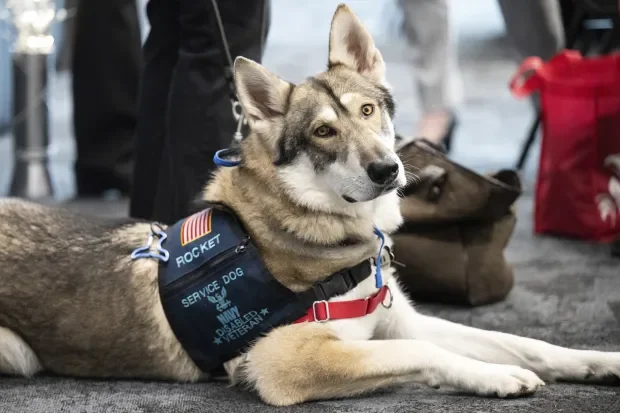PAWS FOR HEROES
How can having a shelter dog help a veteran with PTSD?
Scientific evidence of a dog’s impact on humans has been studied for many years. More than 30 years ago, a study produced evidence that the act of petting a friendly and familiar dog lowers a person’s blood pressure, causes the heart rate to slow down, making breathing more regular and causes tensed muscles to relax. All of these add up to reduced stress.
- Recent studies have gone further, showing that a dog actually changes blood chemistry, reducing the amount of stress-related hormones produced by the body. Moreover, the positive effects build up over time. Depression and anxiety can be lessened.
- Praising the dog can help overcome emotional numbness. Playing with a dog reduces feelings of anxiety and, by encouraging veterans to focus on the present moment, help them not dwell on painful memories.
- Bonding with a dog elevates hormones that improve trust and overcome paranoia. Owning and bonding with a dog causes the brain to produce chemicals that are the direct opposite of chemicals associated with PTSD.
- Walking a dog improves physical health. When the veteran walks through their neighborhood with their dog, the activity provides an opportunity for casual, low-stress interactions with neighbors, which reduces feelings of isolation and facilitates reintegration into society.
- Companion dogs can help to counteract the cycle of depression, anxiety, sleeplessness and improve the military member's overall well being. One of the ways a companion dog can help is by allowing veterans to express their feelings and clarify their thoughts to the dog without concern that the companion dog will interrupt, offer criticism or judgment, or pass the information on to others, as may occur in human interactions. Why would this help a veteran? Confiding in one’s companion dog provides similar benefits to expressive writing in which disclosure of emotionally meaningful matters has been scientifically documented to help deal with traumatic experiences.
- Adopting a shelter dog provides a military member the satisfaction of helping another living being, which can help to assuage some of the feelings of guilt they might experience from events that occurred in combat or survivor's guilt over why their lives were spared but others were not.
- Companion dogs enhance sleep by giving veteran's a greater sense of security at night. Some dogs can wake military members who experience nightmares or comfort them if they have experienced a bad dream.
- Having to get up and walk with their companion dog in the morning and evening at the same time each day helps regulate the veteran's sleep-wake cycle, making it easier to fall asleep the next night and get up the next morning.
When the small but significant changes described above begin to add up in a veteran's life, the veteran will usually begin to be less depressed and have an increased interest in social and work activities. At the same time, the veteran may also experience a reduction in fear in social situations which may help facilitate their reintegration.
What we hear many of our veterans say when we visit them is that their Paws for Heroes dog has become their best friend, and with their dog, they feel like anything is now possible in life.

